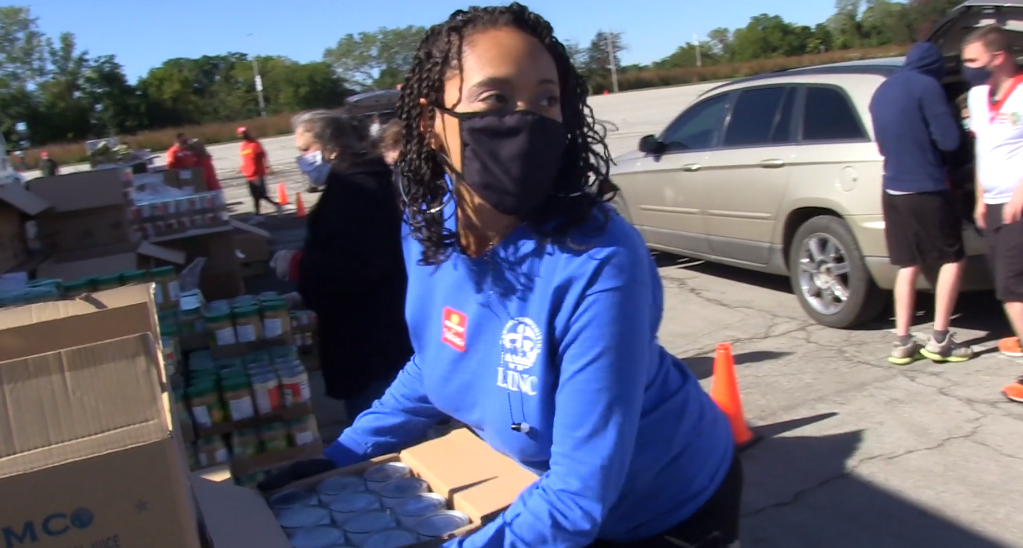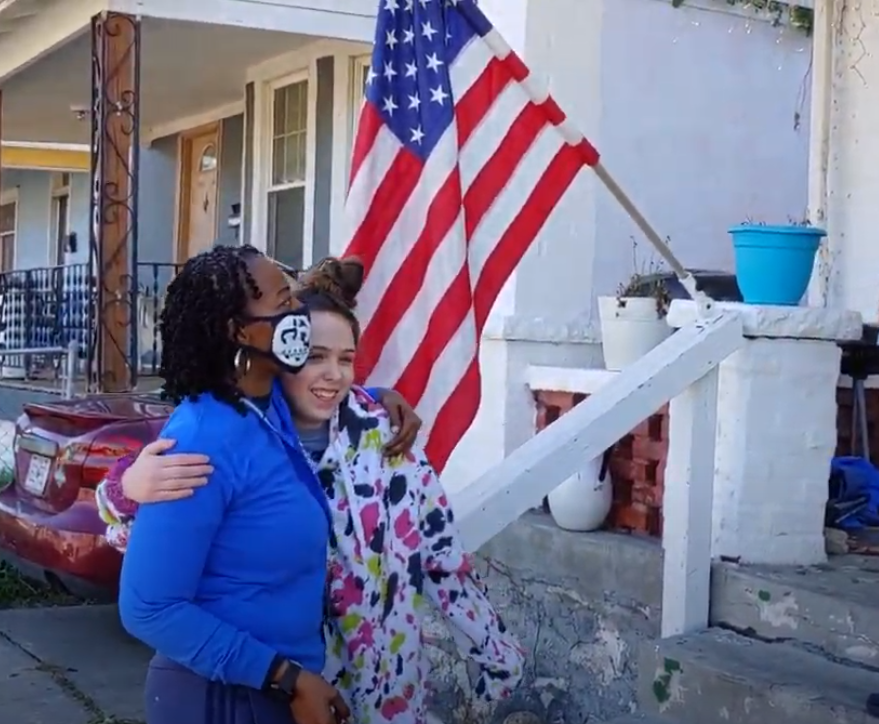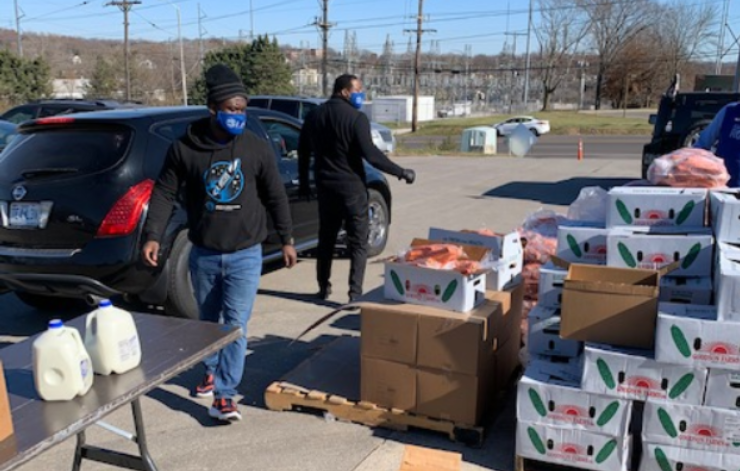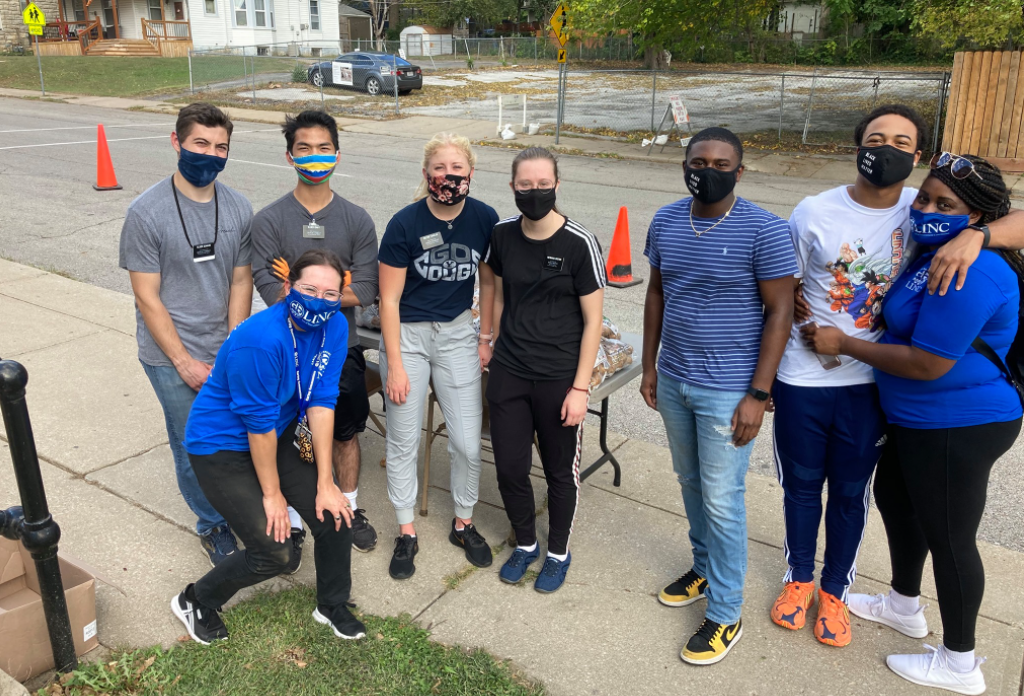LINC expands community efforts to bust pandemic's barriers for children and families
LINC coordinator Marlisa Collins helps package food to go into the hundreds of cars that came to a Harvesters event and voter registration drive at the Truman Sports Complex in late September.
The Trailwoods Elementary School mother’s needs came tumbling out like the insides of a dumped suitcase.
This was going to take some doing — finding temporary storage, relief from utility bill debt in the thousands of dollars, and fulfilling her child’s prayer that someone help her family get a new home by her mid-November birthday.
But as LINC team members Jeff Hill and Melanie Scott stood with the family in a Kansas City shelter taking stock of the challenges ahead, they also saw the little girl at their feet lacking an adequate coat and shoes.
Step one, Hill said, was simple. Make a run to the store and take care of that.
LINC coordinator Steve McClellan works with other volunteers at the Truman Sports Complex food distribution and voter registration.
The recounting of what came next both inspired and echoed the work they and other leaders of LINC’s Caring Communities have done since the pandemic turned so many lives inside-out.
LINC’s work to support and empower families had to become more creative, more persistent.
“The complexity of what families are dealing with” has multiplied, said Hill, a LINC site supervisor. The usual methods of the social services safety net have not kept people from slipping though.
“You can’t stop,” he said, “even if the traditional path doesn’t work.”
In a recent daylong series of virtual meetings, the site coordinators and leadership of LINC’s more than 50 school-based programs paused to contemplate each other’s work, and breathe.
They are seeing families, stricken across multiple generations by Covid, “who are dealing with loss,” said LINC Site Coordinator Adrian Wilson at Meadowmere Elementary School in Grandview.
The reality of the coronavirus “is here” for the LINC coordinators’ families too, said Boone Elementary Site Coordinator John Herrera in the Center School District, because some of their own families have suffered losses.
Many coordinators are parents themselves, said Topping Elementary Site Coordinator Lindsay Bosse in North Kansas City. They’re anxious to keep their own children learning and growing even as positive cases rise and classes or entire schools go back into quarantine, altering life’s demands “day by day, hour by hour.”
Many times LINC staff meet with masks on out in their communities — distributing books for children, school supplies and information resources, helping with the challenges of technology, or joining alongside churches supporting their outreach to neighbors.
“I feel like a social worker again,” Longfellow Site Coordinator Torran Sayles in Kansas City said. “It’s filled my spirit.”
LINC coordinator Yolanda Robinson greets one her Faxon Elementary families while making home visits in late October.
In LINC’s November Commission Meeting, LINC earned praise from the leaders of its partner school districts, who are engaged in the courageous work lifting up their district families.
Yaw Obeng, in his first year as Hickman Mills superintendent after coming from Vermont, has been getting acquainted with his new district’s versatile partner.
“I was hearing about ‘LINC’ — What is ‘LINC’?” Obeng told the commission. The answer, he said he learned, was, “They do everything.”
That means joining old strategies with new strategies to bring hope like Scott was determined to deliver with Hill to her distressed Trailwoods family.
“They’re squashed by the frustration they’re having,” said Scott, the site coordinator at Trailwoods. But that’s when LINC’s team burrows into problem-solving mode and says, “Let’s see what we can do.”
Who’s driving the school bus?
That was Steven Morgan, the Fort Osage School District’s assistant superintendent for finance operations, taking the wheel of the bus in a pinch this month.
And teaching 7th grade social studies.
“It’s all hands on deck,” Morgan told the LINC Commission, as districts that have students in classrooms are dealing with a region-wide shortage of supplemental personnel as quarantines and caution impact substitute teachers and bus drivers.
LINC’s site coordinator at Buckner Elementary in Fort Osage, Connie Parker, has been working some cafeteria lunch duty, she said. It helps the school deal with a staff shortage, but it also gives her more opportunities to listen to students who already trusted her.
“I’m finding out what their needs are,” she said.
LINC coordinators Rashad Wahab, left, and Bryan Geddes help load food for Center School District families in November.
LINC is rushing out with school supplies and clothes to families’ homes, said Megan Hunter at Indian Trails.
“We are gap-filling,” said Steve McClellan at Cler-Mont. It’s a role he’s played all along, with a clothing and emergency supply closet in his LINC office. But now, more than ever, he said, “we’re seeing parents who have moved in with relatives . . . moved in with friends,” and families are stretched.
LINC, said Martin City Site Coordinator Matt Uppman in the Grandview School District, brings “a consistency” that families need. He gets calls and texts at night from parents seeking answers and assurances in a shifting world that often feels like “a crazy piece of mess.”
“You don’t really know what’s happening in the next household,” said Danisha Clarkson, LINC’s site coordinator at Banneker Elementary School in Kansas City.
You don’t know, she said, unless you seek out the mother who is stressed and listen — and cry together, as it happened in one of her calls to offer help.
You don’t know unless you knock twice — three times if you have to — and wait, said Deanna Snider, the LINC coordinator at Carver Dual Language Elementary School. Then you figure out ways to give aid, like she did in helping a parent get her family’s critical Wi-Fi working again.
You don’t know unless you give yourself a chance to meet neighbors who have sacrificed.
Truman Elementary Site Coordinator Wesley Cunningham’s “Door Busters Squad” was out knocking and delivering aid when they met a man who had taken on the care of four young siblings — not related to him but the grandchildren of a friend in trouble. Keeping them out of foster care. Keeping them together.
Not because it was easy.
“It’s just a blessing,” Cunningham said, “that we can give help . . . to a lot of people out there who are doing things for each other.”
Blue-shirted LINC coordinators Rene Jones, left, and Qiana McGee, right, pose at a Calvary Community Outreach Network event in October with volunteers from Lincoln College Preparatory Academy and the Church of Jesus Christ of Latter-Day Saints.
Getting to the other side
Imagine where we’ll be.
Eric Lanier, LINC’s site coordinator at James Elementary in Kansas City’s Northeast neighborhood, talked about the resources he’s added to his repertoire.
So much has been gained, working alongside Hill and other site coordinators, and learning from their colleagues in LINCWorks, whose case managers’ job all along has been to help build career and life-coaching resources for Missouri parents who receive funds through the Temporary Assistance for Needy Families (TANF) program.
These amped-up skills are going to last, he said — watching how Hill, Scott and LINCWorks persisted with the Trailwoods mother and found housing she could afford with her $1,400 a month income.
And patched together the relief funds to free her from the crippling utility debt.
Got the family in a home for the daughter’s birthday. And delivered a Christmas tree.
They even enrolled the mother through LINCWorks into Missouri’s job-training SkillUP program.
Imagine when schools open again and LINC is fully immersed in the before- and after-school programming its families know so well, and all are gathered again in the new world beyond the pandemic with these crisis-honed abilities.
“We’re able to provide services when other agencies can’t,” Lanier said. “We’ll keep on doing what we’re doing. We are going to hit the ground running.”
By Joe Robertson/LINC Writer






